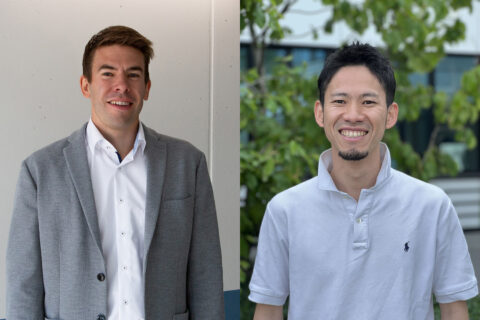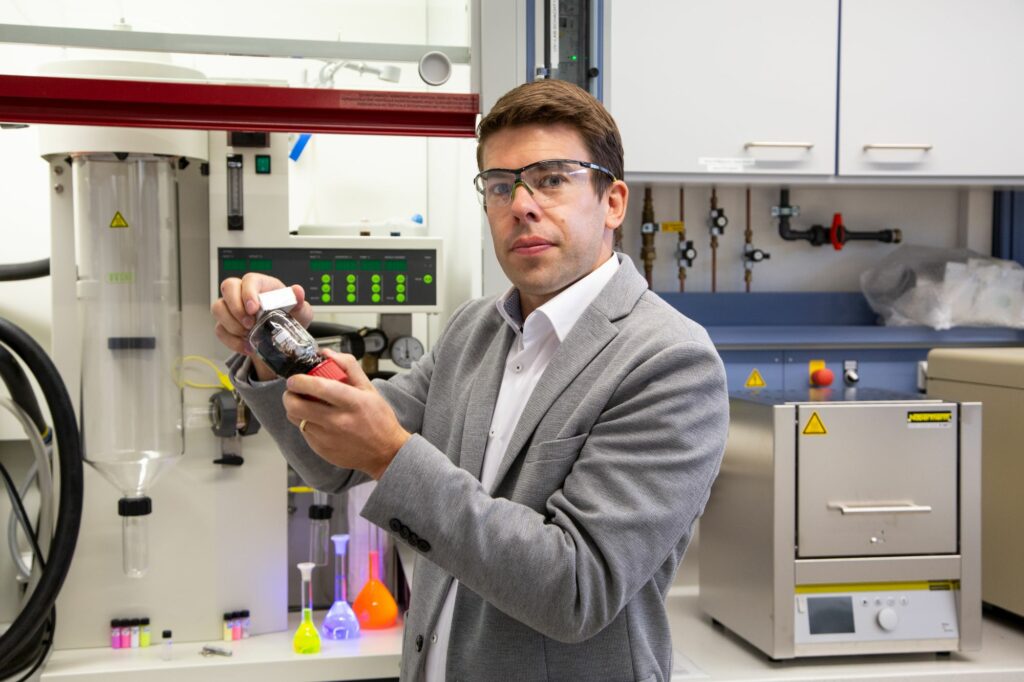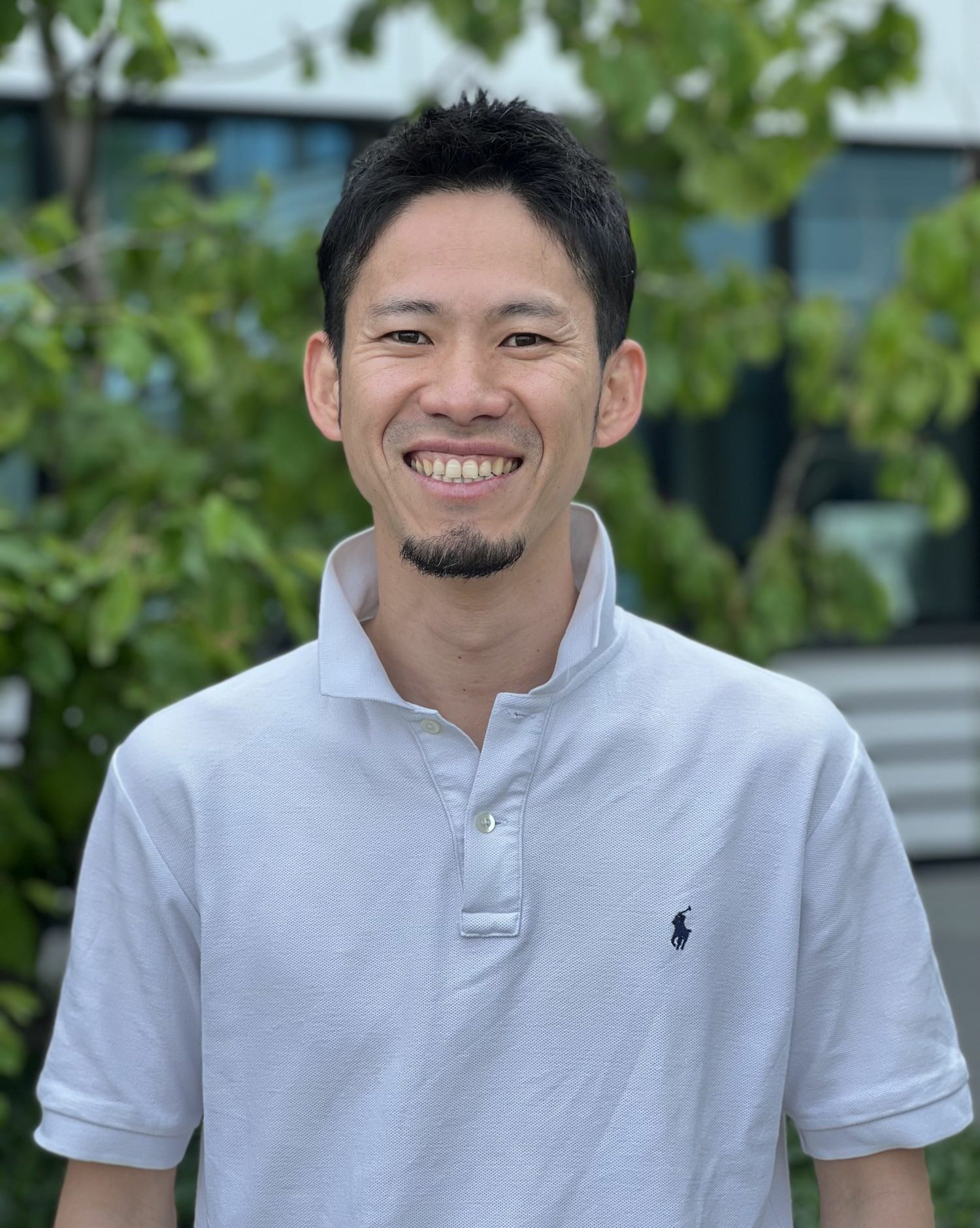Two Consolidator Grants for FAU

Materials chemist Karl Mandel and neuroscientist Tomohisa Toda receive funding from the ERC
It is further proof of FAU’s excellence when it comes to research: Two scientists have been awarded a Consolidator Grant from the European Research Council (ERC). Prof. Dr. Karl Mandel aims to functionalize matter in such a way that it can give information about past environmental stimuli. Prof. Dr. Tomohisa Toda investigates the role of RNA in retaining brain function and how these findings can be used for the prevention and treatment of age-related neurological diseases. The ERC Consolidator Grant entails two million euros in funding over a funding period of five years.
Wants to make material speak: Prof. Dr. Karl Mandel
Materials have to withstand a lot: They are faced with environmental factors such as heat, cold or moisture, mechanical forces are exerted on them and during their manufacture it has to be ensured that the various steps in the process were successful, for example that compound materials are stuck together reliably. Inspection processes aimed at screening materials are expensive and complex. This is one reason why components are often replaced as a precaution or products simply discarded instead of being recycled, despite the fact that they might have still been able to be used.
Karl Mandel, Professor of Anorganic Chemistry at FAU and Head of Particle Technology at Fraunhofer Institute for Silicate Research ISC in Würzburg hopes to change that. He wants to functionalize matter in such a way that it can tell its history. “Materials and components should be made able to perceive, record and inform us of environmental stimuli, across the whole of their life cycle,” he explains.

At the core of his vision are supraparticles just several micrometers in size consisting of two central components: magnetic signal transmitters based on iron oxide, in other words basically rust, and non-magnetic sensitizers. “If the individual sensitizers undergo any specific changes due to environmental stimuli such as temperature, moisture or mechanical strain, this leads to a change in the structure of all the supraparticles, which in turn affects the magnetic interactions of the components responsible for transmitting signals,” explains Mandel. “We want to read the magnetic signals and see how this correlates quantitatively with the environmental stimuli.” As a simple example, Mandel mentions table salt, whose structure degrades upon contact with water and which could act as an indicator of moisture when used in conjunction with iron oxide.
Karl Mandel hopes to transfer the principle of “smart rust” to various areas: a comprehensive, destruction-free inspection of materials could simplify predictive maintenance. In recycling processes, it would be easier to decide whether materials can be recycled and used again or if they should be discarded. The procedure could also make an important contribution to the Industrial Internet of Things, as the magnetic pattern could indicate whether processes have been executed correctly and the functionality of the components guaranteed. The special feature of all these scenarios is that the information can be accessed from within the materials themselves, from areas that have remained hidden from scrutiny until now.
Karl Mandel has been professor of anorganic chemistry at FAU since 2020, and Head of the Particle Technology Group at the Fraunhofer Institute of Silicate Research ISC in Würzburg since 2014. He completed his doctoral degree in 2013 at Julius-Maximilians-Universität Würzburg. His research interests lie in the production of supraparticles with new and unexpected properties and their use as intelligent objects that can make a contribution to sustainability.
Wants to discover what makes neurons robust: Prof. Dr. Tomohisa Toda
Neurons, the nerve cells in our brain, are extremely long-living and are virtually never replaced by new cells. It is therefore crucial that they retain their function and their cell type as robustly as possible. “Understanding the basic mechanisms for the durability and continued existence of neurons is the key to preventing and treating age-related neurological diseases,” explains Dr. Tomohisa Toda, professor of neural epigenetics at FAU.

Toda already started investigating the mechanisms behind the cell-specific epigenetic programs in the brain as part of the EAGER project funded by an ERC Starting Grant. Epigenetics refers to the cellular processes that influence the activity of genes but are not based on a change in the DNA sequence. “My team was able to discover several protein-based mechanisms that are responsible for the long-term functioning of nerve cells,” explains the neuroscientist.
Parallel to these mechanisms, the working group led by Tomohisa Toda has now also discovered that certain RNA in the cell nucleus are very stable and possibly involved in the long-term epigenetic regulation in the brain. As a rule, RNA are only short-lived, as they are constantly being broken down and rebuilt into new RNA strands.
In NEUTIME, the name of the project currently funded by the ERC, the Toda lab will investigate the role of these RNA in the nucleus in retaining brain function and in aging processes within the brain. As Toda explains, “Our aim is to gain a deeper understanding of the role RNA plays in epigenetic regulation. We also hope to discover when the RNA metabolism leads to biological dysregulation which in turn leads to age-related neurological diseases, and what we can possibly do to prevent this from happening.”
Tomohisa Toda completed hs doctoral degree in neurosciences in 2011 at the University of Tokio. As a postdoctoral researcher, he moved to the Salk Institute for Biological Studies in San Diego, USA, where he conducted research into the epigenetic mechanisms of adult neural stem cells. In 2019 he was awarded an ERC Starting Grant and set up a research group at the Deutsches Zentrum für Neurodegenerative Erkrankungen e.V. (DZNE) in Dresden. As part of the High-Tech Agenda Bavaria, Toda moved to FAU and the Max-Planck Center for Physics and Medicine (MPZPM) Erlangen in 2022.
Further information:
Communications and Press
Phone: +49 9131 85 70229
